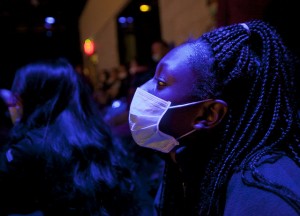 More than a thousand people descended upon the Lafayette College downtown Williams Arts Campus in spring 2015 to secure tickets, don requisite surgical masks and silently explore a groundbreaking multi-venue, multi-era, multimedia infused performance piece.
More than a thousand people descended upon the Lafayette College downtown Williams Arts Campus in spring 2015 to secure tickets, don requisite surgical masks and silently explore a groundbreaking multi-venue, multi-era, multimedia infused performance piece.
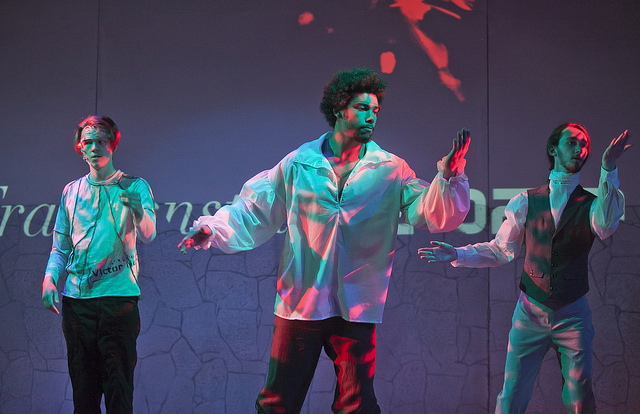 Frankenstein 2029 was an immersive visual arts, theater, music, dance, film and media experience based on Mary Shelley’s gothic novel that challenged both the boundaries of live performance and what it means to be human in an ever accelerating technological world.
Frankenstein 2029 was an immersive visual arts, theater, music, dance, film and media experience based on Mary Shelley’s gothic novel that challenged both the boundaries of live performance and what it means to be human in an ever accelerating technological world.
Yes, we sat (or stood) and soaked up a simultaneous Frankenstein telling of both former and forthcoming times. But we did more. Much more.
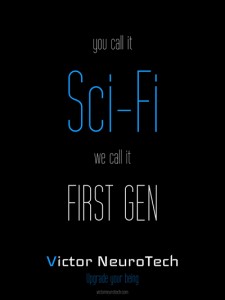 We stole into Victor Neurotech’s lab and beheld the unveiling of their latest wondrous prototypes, all the while hearing the warnings of the picket wielding SAViN protesters in the street below.
We stole into Victor Neurotech’s lab and beheld the unveiling of their latest wondrous prototypes, all the while hearing the warnings of the picket wielding SAViN protesters in the street below.
We hung out with Mary and her ghost parents in her boho bedroom. We watched icebergs dance about Captain Walton’s trapped ship and his crew. We explored birth, witnessed death and despair, and were healed by the forest and the feminine alike. Not necessarily in that order.
Some of us trailed the lumbering yet poetic historical creature across North 3rd Street, while the more intrepid even shadowed the verbally volatile future Victor Frankenstein right into the WVAB elevator. Like life, never knowing quite what to expect or which way to venture.
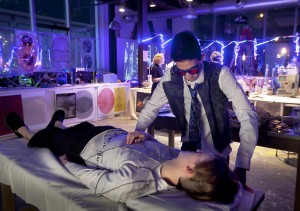 The creation of art professor Ed Kerns and English/theater professor Suzanne Westfall, Frankenstein 2029 embodies the College’s mission to infuse the arts across the curriculum and drive true cross-disciplinary collaboration. 80+ students, faculty, staff & alumni fused their expertise in neuroscience, art, chemistry, computer science, engineering, English, theater and more to bring Frankenstein 2029 to life.
The creation of art professor Ed Kerns and English/theater professor Suzanne Westfall, Frankenstein 2029 embodies the College’s mission to infuse the arts across the curriculum and drive true cross-disciplinary collaboration. 80+ students, faculty, staff & alumni fused their expertise in neuroscience, art, chemistry, computer science, engineering, English, theater and more to bring Frankenstein 2029 to life.
Westfall was performance director and, with English major Gavin Knox ’17, wrote the script for the theatrical production. Students in the course Making Theater: Frankenstein 2029, which Westfall co-taught with Kerns, also played a vital role in bringing the performance to life.
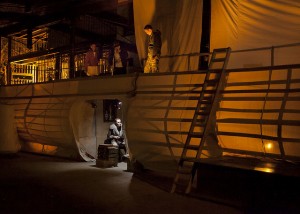 The project was part of the College’s START initiative, which was funded by a grant from the Andrew W. Mellon Foundation. Sponsors also included the Office of the President; IDEAL, L.A.F.; and the departments of biology, computer science, engineering, English, and neuroscience.
The project was part of the College’s START initiative, which was funded by a grant from the Andrew W. Mellon Foundation. Sponsors also included the Office of the President; IDEAL, L.A.F.; and the departments of biology, computer science, engineering, English, and neuroscience.
“With Frankenstein 2029, we tackled the big, transcendent questions facing us all: the nature of humanity’s connectivity, the impact of socio-economic and gender inequalities, the ethics of extending life, and most especially technology’s current and future role in our lives,” says Kerns. “How will we be changed, individually, collectively, by these issues?”
@SciArtinAmerica: @Frankie2029 is “wonderfully wild testament to x-disciplinary collaboration & inventive pedagogy” https://t.co/MJqpSkEOuD
— Frankenstein2029 (@Frankie2029) April 24, 2015
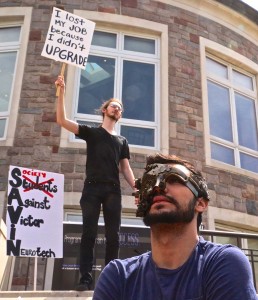 While the production has concluded, the greater transhumanist debate is just heating up. We encourage you to check out the Victor NeuroTech and SAViN (Society Against Victor NeuroTech) sites and their various social media manifestations. Then join the debate as to whether technology and the approaching singularity (when machine becomes smarter than man) is ultimately to be feared or heralded.
While the production has concluded, the greater transhumanist debate is just heating up. We encourage you to check out the Victor NeuroTech and SAViN (Society Against Victor NeuroTech) sites and their various social media manifestations. Then join the debate as to whether technology and the approaching singularity (when machine becomes smarter than man) is ultimately to be feared or heralded.

